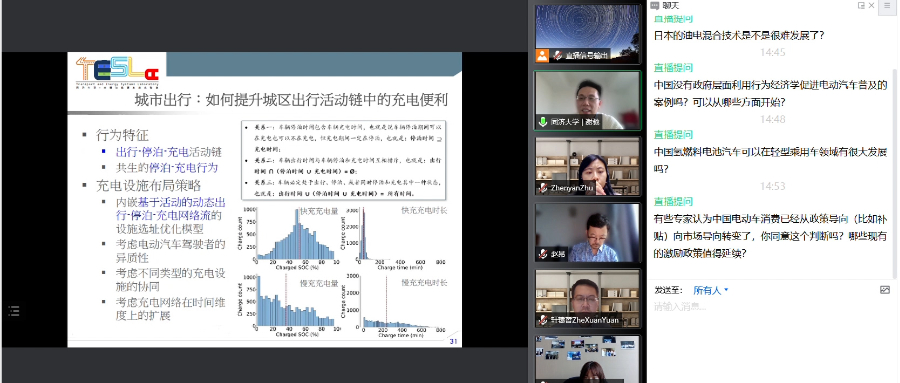

On December 10, 2021, with the support of Heinrich-Böll-Stiftung, Beijing Representative Office, REEI successfully held an online webinar titled "Carbon Emission Reduction in Transportation Sector: The Role of Behavioral Change in the Popularization of Electric Vehicles".
The webinar included Report Release, Experts Sharing, and Roundtable Discussions. Professor Xie Chi from the College of Transportation Engineering of Tongji University and Associate Professor Xuanyuan Zhe from United International College (UIC) were invited. In the context of increasingly iterative technology driving the development of electric vehicles, this webinar focused on the role of behavioral change in the adoption of electric vehicles, and then launched an in-depth discussion on respective roles of "behavior" and "technology" in transportation emission reduction.
The report analyzed the "similar" and "differentiated" roles of traditional rational decision-making process based on profit maximization, and "context" decision-making process based on behavioral economics in the popularization of electric vehicles in Europe, California and East Asia. After compiling examples of using behavioral economics in accelerating electric vehicles popularizaion in three East Asian countries, especially in China, a summary was formed analyzing case studies while applying the "context" model. We hope that this report would help promote policy discussions and push for the faster adoption of electric vehicles with principals of behavioral economics and encourage related policy innovations.
This report was divided into six chapters, starting with the discussion on how different decision-making models can change people's behavior to promote the popularization of electric vehicles, followed by EV policy development in the EU and the US, expanding into both traditional policy factors and behavioral economics experiences from China, Japan and South Korea in promoting electric vehicles, finally feasible and effective policy suggestions on the potential of behavioral economics models influencing the popularization of electric vehicles, under current climate situation.
The two guest speakers commented on the report. Professor Xie Chi believed that "this report is a novel research report that can complement existing studies on the purchase, use and promotion of electric vehicles". Professor Xuanyuan Zhe commented that "the data used in this report is very detailed and comprehensive, integrating many case studies from different countries and regions and is of great research value". Professor Xie and Professor Xuanyuan also gave presentations on corresponding research fields.

Professor Xie Chi specializes in using Strategy and Management Science, Micro and Regional Economics, Cognitive and Behavioral Science and other multi-disciplinary approach to analyze and forecast economic and social phenomenon in transportation systems; as well as setting up optimization models, providing strategic suggestions for the planning, control, operation, and management of large comprehensive transportation systems. His talk was titled "Challenges and Opportunities of Electrification of Urban Transportation", centered on three main questions, namely why should we vigorously develop and popularize electric vehicles? What's the key challenges in EV popularization? What were the problems and measures in charging facility planning? Professor Xie believed that the significance of large-scale popularization of electric vehicles was not only about environmental pollution and climate change, but also a solution to economic development and industrial transformation that could greatly affect China's energy and strategic security.
Another important factor in reducing carbon emissions in transport is technological advancement, which often go hand in hand with behavioral change. Discussing transportation technology development and emission reduction, Xuanyuan Zhe, Associate Professor of UIC, shared his opinions titled "Key Technologies in Autonomous Driving and Its Traffic Impact". Through analyzing existing research results from the key technologies in autonomous driving, he shared how the transportation industry could reduce traffic emission while achieving authentic autonomous driving. Energy saving and emission reduction was one of the reasons explaining the rapid development of autonomous driving technology, which can also contribute to the reduction of vehicle ownership, ineffective public transport, and the improvement of traffic efficiency. Therefore, autonomous driving technologies are not limited to transforming the way of travel, it could also generate huge economic and social value.
In the following Roundtable Discussion session, participants discussed multiple topics including policy and technical challenges for the development of electric vehicles under China's "Dual-Carbon" commitments, opportunities and difficulties for carbon emission reduction and behavioral change in transportation, policy suggestions for developing electric vehicles, and how to achieve just transition in transportation decarbonization. Specific suggestions from the report were put forward for the government and enterprises on how to increase the popularization of electric vehicles in China in the next ten years. Suggestions based on behavioral economics can enrich the discussion on the popularization policy of electric vehicles in China by adding a unique perspective.
Due to Covid-19 restrictions, the webinar was hosted online instead of a in-person seminar, forgoing opportunities for participants and colleagues to have face-to-face interactions, but we look forward to seeing you in person next year. The end of this webinar concludes this year's "Low Emission Transport" program, which was sponsored by Heinrich-Böll-Stiftung, Beijing Representative Office. Professor Xie Chi and Professor Xuanyuan Zhe, gave us research support during the project; Beijing Shunyi Association for Science and Technology, the responsible unit of REEI, also provided guidance and assistance to our work during the project, we hereby express our sincere gratitude.
Donors: Heinrich-Böll-Stiftung, Beijing Representative Office




